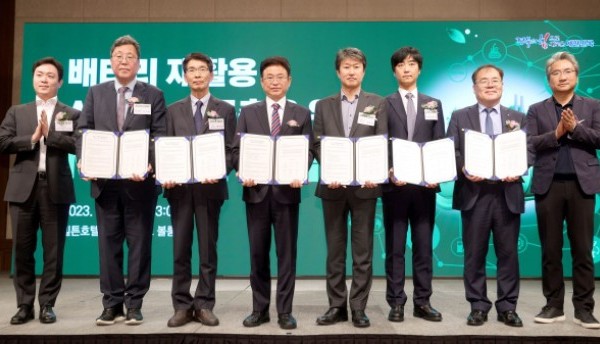
Kia Corp. has signed a memorandum of understanding (MOU) with South Korean stakeholders to encourage a circular economy in the electric vehicle battery industry, the carmaker announced October 6.
The company said that the key objective of the MOU is to create a sustainable value chain across the entire EV battery industry and initiate a pilot project through collaborative efforts. The said pilot project will be managed by Kia, which will supply used EV batteries and will also oversee the overall business.
Without disclosing the names of the South Korean stakeholders, the carmaker said that other participants in the circular economy initiative included companies specializing in battery disassembly and raw material extraction, as well as the South Korean government.
Significance: According to Kia, the MOU marks a groundbreaking public-private collaboration in South Korea to promote a sustainable EV battery ecosystem. It aims to forge a cooperative system across the entire industry, spanning from automaker and battery recycling companies to second-life battery material manufacturers and the local government.
Kia's goal is to establish a circular ecosystem for EV batteries and enhance their residual value based on the results of the pilot project. In addition to that, Kia plans to take a leading role in the commercialization of Battery-as-a-Service (BaaS) through initiatives such as battery subscription and battery remanufacturing services. From this point of view, the collaboration appears to be crucial for Kia, which will use the pilot project to evaluate the economic feasibility of EV batteries as the number of EVs continues to rise, leading to an accelerated accumulation of used batteries.
“The initiative is essential to verify the battery recycling process and utilize previously used batteries for optimum effect,” the carmaker said, adding that this comprehensive approach will collect detailed data at each stage of the value chain of EV batteries, from raw material extraction, subsequent battery production and installation in EVs to recycling used batteries at the end of life.
Kia said that the empirical results obtained from the pilot project will be carefully analyzed and utilized to promote new business opportunities and ultimately contribute to the development of a robust industrial ecosystem. The South Korean carmaker aims to develop a circular ecosystem for the EV battery industry on a global level.








